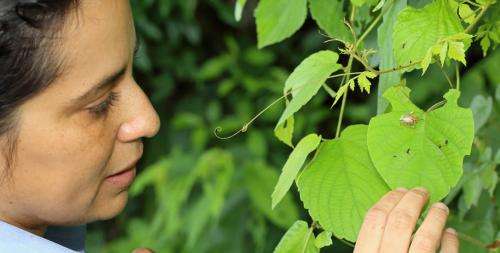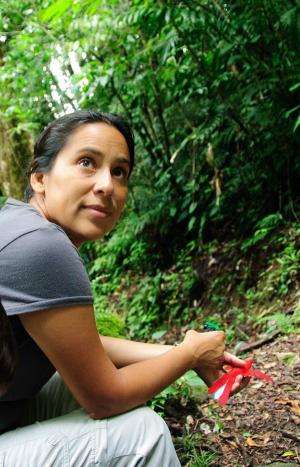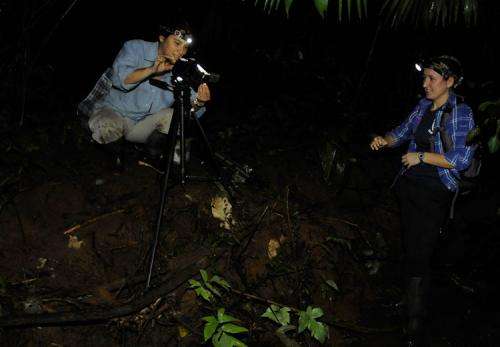Behavioral ecologist studies beetle charisma

What attracts partners to each other? Is it a flashy car? A bright, colorful outfit? And how do these preferences ultimately affect the evolution and diversity of a species over time?
These are a few of the questions that Biology Prof. Paula "Alex" Trillo aims to answer for the animal world with her research involving beetles, bats, and frogs in the tropical forests of Central America. Primarily a behavioral ecologist, Trillo's field research has taken her to different parts of the world, including her native Peru, Ecuador, Costa Rica, and Panama. With her research on sexual selection, Trillo wants to understand how different ecological pressures can affect an animal's mating behavior, and how this in turn, determines the evolution of a species.
New to Gettysburg this fall, Trillo completed her Ph.D. in Organismal Biology and Ecology at the University of Montana and teaches courses in Animal Behavior and Vertebrate Zoology in the biology department. "When I teach my courses, I look to bring in a lot of examples about animals that are not well-known and exhibit a wide-range of fascinating behaviors," Trillo said.
Trillo has two areas of research - one that looks at the tortoise beetle, Acromis sparsa, and another that looks at the predatory relationship between fringe-lipped bats and tungara frogs.
For her research with beetles, Trillo studies the relationship between primary sexual selected traits (genitalia, testes, and courtship behavior), and secondary sexual selected traits (weaponry such as horns and spines, and sexual adornments such as tails, and feathers), and how these traits interact with each other in different environments to influence the fertilization success of a male.
"When is it more important for a male to have large weaponry and when is it more important to have large testes? Different circumstances will require very different male strategies," Trillo explains.
Over the last 10 years, Trillo has traveled to Panama to study animal behavior in the rainforests of Soberania National Park, with the support of the Smithsonian Tropical Research Institute (STRI), one of the leading research institutions in the world.
"STRI houses scientists from all over the world working in different fields. It's a one-of-a-kind institution to do tropical research because of the many collaborations you can have with both STRI staff scientists as well as with scientists from other universities," she said.
During the summer, Trillo brings undergraduate students to do research internships with her in Panama. Trillo and the students build semi-natural enclosures to conduct experiments and record the data. Her students experience firsthand what it is like to do field work in the tropics.

"One day we will be knee deep in the mud looking for frogs, the next we will be under plants and trees collecting beetles, and at night we will be setting up mistnets to catch and handle bats," Trillo said.
The students also use different techniques to study behavior. For example, she and her students create large insectaries for beetles and use tropical vines to mimic the favored environment.
"We alter various factors within the habitat, ranging from the number of females present to the amount and type of predators in the environment. We can see how these factors might impact the likelihood of a female to mate, and of a male to successfully sire offspring," Trillo said.
Trillo's research with beetles is unique in that she looks at the effect of primary and secondary sexual traits during two different stages of male reproduction, the mating stage, where a male needs to successfully acquire a female; and the copulating stage, where a male needs to successfully fertilize the female.
"Because a male fights for and pairs with a female, it doesn't mean he will successfully fertilize her," Trillo says. "So most studies, which only look at male mating success, might be getting an erroneous measurement of the success of a male." To have an accurate idea of male reproductive success, Trillo uses paternity analyses of the experimental offspring in her insectaries.
Eavesdropping bats
Her second area of research looks at how having predators in the environment affects the diversity of mating calls. The fringe-lipped bat - which is a frog-eating bat - is keen on consuming tungara frogs. The bat finds these prey by homing in on the mating calls the frogs use to attract females.
"These calls can be very costly for the frogs," Trillo explains, as the same call that attracts a mate also alerts its predator. Once the eavesdropping bat hears the call of a tungara frog, it swoops down from its hiding spot to eat the frog.
"The mating calls can be complex or simple. Both the bats and female tungara frogs are highly attracted to the complex calls," Trillo said. She has found that the frog species which call in environments with higher numbers of predators make only simple calls, which are safer because they attract fewer bats. However, these simple calls are not attractive for female frogs that live in areas with complex calls.
"Geographic variation in the abundance of predators can affect sexual communication among the frogs," Trillo said. "This leads to a situation where male frogs from populations with high bat predation are less likely to mate with females from populations where predation has been low."
"Predators could potentially affect population divergence, and ultimately speciation," said Trillo.
Future Endeavors
Trillo says her research has importance for different species worldwide, especially those whose environments are at-risk from human activity.

"The information we get from these animals can be generalized across different species. A long standing question in biology is how might species diverge and separate? What are the factors by which they diverge?" Trillo said. "There is a lot more diversity than we know within each species. It's important to know the factors that influence high species diversity, especially with their environment being threatened as more tropical forests come down."
Trillo plans on establishing internships at STRI where Gettysburg College students will conduct a research project with students from Latin America during the summer. Students interested in these internships can reach out to her at ptrillo@gettysburg.edu.
Provided by Gettysburg College


















